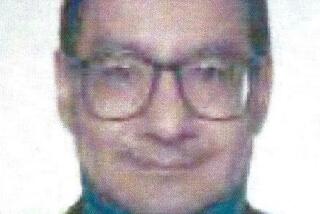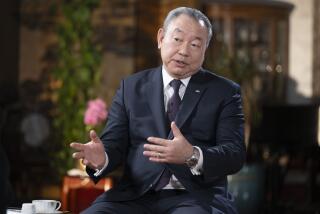Investigation of Ex-Envoy to Taiwan Grows
A U.S. government investigation of a former American envoy to Taiwan, which began with charges that he had improperly solicited foreign contributions to President Clinton’s reelection campaign, has expanded to new allegations that he used his diplomatic position for private business pursuits, U.S. officials said.
The envoy, former Washington lobbyist James C. Wood, urged several leading Taiwan businessmen to dump one firm that was handling their interests in the United States and to consider hiring another headed by one of his friends, according to two Taiwanese men familiar with the conversations.
And two Taiwan arms dealers reportedly said Wood offered to broker a private sale of weapons, according to a Taiwanese editor who testified about the matter in a pending lawsuit.
U.S. officials said FBI investigators were looking into those charges, which came after a string of allegations that Wood sought campaign contributions--by arguing, according to some Taiwanese, that they owed the president money in return for his defense of their security interests. An inquiry by the State Department inspector general’s office has been included within the FBI probe.
After U.S. Navy aircraft carriers were sent to the Taiwan Strait last year to protect the island during Chinese missile tests, Wood told a number of people, including Parris Chang, a leader of Taiwan’s main opposition party, the Democratic Progressive Party, that the action cost the United States “a lot of money” and urged his Taiwanese contacts to find a way to “reciprocate,” according to Chang.
One U.S. investigator, who declined to be identified, told The Times that the variety of allegations constituted the most “bold and blatant” example veteran State Department officials could recall of the abuse of a diplomatic post.
Wood’s post was managing director of the American Institute in Taiwan for two years until his resignation Jan. 17. The quasi-public institute serves as the U.S government’s diplomatic representative to the island--which China considers a renegade province--in lieu of an embassy.
The fund-raising allegations against Wood are part of a wider Justice Department inquiry into the solicitation of illegal Asian donations by Democratic Party fund-raiser John Huang and other Clinton supporters. Foreigners who are not legal permanent residents of the United States are barred by law from contributing money to U.S. elections.
Other allegations under investigation by the FBI, according to sources close to the probe, involve statutes that bar U.S. officials from using their positions for private gain.
The Wood controversy is particularly troublesome for the White House because, unlike other aspects of the fund-raising scandal, responsibility cannot be directed in part at party or campaign functionaries.
*
Wood, an Arkansan, has been a close friend of Clinton’s since the 1960s and was the president’s handpicked emissary to Taiwan. His problems follow those of several other Clinton friends who received prominent government appointments, and came in a volatile region in which the United States has sensitive national security interests.
Before becoming managing director of the American Institute in Taiwan, Wood had run his own lobbying firm in Washington, representing both foreign and domestic clients, since 1984. His earlier State Department experience included two years as legal counsel in the Office of Foreign Missions, four years in the Office of Legal Advisor and two years as a lawyer working in the U.S. Embassy in Bonn. He joined the embassy staff in Bonn after working five years as a civilian lawyer for the Army in Frankfurt, Germany.
Wood, who lives in the Washington area, did not respond to phone calls seeking comment on the allegations. In an interview with Newsweek in October, he denied pressuring businessmen for donations. But when asked if he ever told any to get in touch with Huang to make political contributions, he replied, “That could have happened.”
Even before allegations of wrongdoing by Wood came to light, he seemed to be an unusual appointee for such a sensitive diplomatic post. Many in Taipei remember him as an abrasive diplomat who cared more about profits and politics than international security issues.
*
According to P.H. Tsai, chief spokesman for Taiwan’s ruling Kuomintang party, as well as other top officials who declined to be identified, Wood often told Taiwanese business and government officials they had an obligation to back Clinton financially to show their gratitude for the administration’s military support for Taiwan.
Wood often did not specify what he meant, Tsai said, but most people assumed that he was soliciting contributions for Clinton’s reelection. Sometimes, other officials said, Wood did specifically mention campaign contributions.
Unlike Huang, the Democratic Party fund-raiser who visited Taiwan in search of campaign contributions, Wood was operating under tight legal restrictions regarding political fund-raising. The Hatch Act bars government employees from soliciting political funds and, even though Wood technically did not work for the State Department, a department lawyer said he was covered by the Hatch Act because his salary was paid by the government.
Other allegations against Wood go far beyond fund-raising. According to testimony heard recently in a Taipei courtroom, the American envoy boasted at a private dinner party that he could summon U.S. Navy ships in exchange for financial support from Taiwan. Shieh Chung Liang, an editor of Yazhou Zhoukan, a Chinese language magazine, testified that he learned about the remarks from two Taiwanese businessmen and arms merchants who attended the dinner.
He said the arms dealers, whom he declined to identify in an interview, also reported that Wood offered to personally broker the sale of weapons that the United States currently does not sell to Taiwan. A Sino-American communique signed in 1982 limits the types of U.S. weapons that can be sold to Taiwan.
Shieh said in the interview that the arms dealers believed that Wood was “very serious” in the offer.
Shieh’s testimony came in a hearing on a suit brought against his magazine by the Kuomintang for a story alleging that a top party official had offered $15 million to the Clinton campaign. The disputed story did not mention the alleged incident involving Wood, and Kuomintang lawyers did not challenge his testimony on this subject.
Opposition party leader Chang said Wood made pointed comments to him about how Taiwan should “reciprocate” financially after the U.S. warships were deployed during the Chinese missile-test confrontation early last year. Chang said he was unclear exactly what type of payment Wood was requesting for the United States.
On another occasion, Chang told The Times, Wood separately asked two of Taipei’s richest and most prominent citizens--Jeffrey Koo, who heads China Trust Commercial Bank, and Eric Wu, whose wealthy family owns the Shing Kong Life Insurance Co., headquartered in the city’s tallest skyscraper--to hire “his lawyer friends” to replace attorneys they then retained to represent them in Washington.
Spokesmen for Wu and Koo, when contacted by The Times, declined to confirm or deny this story. But Koo’s spokeswoman, Sabrina Wong, acknowledged her boss had one meeting with Wood.
Another Taiwanese official familiar with these allegations said Wood, in his conversations with Koo and Wu, referred by name to a law firm in Washington he wanted the Taiwanese businessmen to hire. The firm employs a longtime friend of Wood’s who is a Democratic loyalist.
Wood’s appointment to the diplomatic post was controversial when it was announced two years ago. Two members of the American Institute in Taiwan board resigned in protest. The job had always been held by foreign service veterans with extensive experience in China, which Wood lacked.
Sen. Jesse Helms (R-N.C.), chairman of the Senate Foreign Relations Committee, also opposed Wood’s appointment. Helms could not block it because it was not subject to Senate confirmation.
Because the United States does not have formal diplomatic relations with Taiwan, the AIT was created in 1979 to provide representation. The institute has offices both in Taipei and Arlington, Va. Wood made three official trips to Taiwan during his two-year tenure.
From the start, Wood’s critics say, he seemed obsessed with ending the political ties between the Taiwan government and the Republican Party in the United States, which stemmed from the days of Chiang Kai-shek.
Many people who met Wood said he advised them that they owed their support to the Democratic Party now that Clinton was president.
*
At the same time, they said, he showed little interest in the primary issue of importance to government officials here: security and relations with China.
While Taiwanese officials are most concerned about the U.S. role in protecting the island’s security, they said, Wood emphasized the American desire to sell more goods to Taiwan.
Even some U.S. businessmen found that troubling. Jeffrey R. Williams, the top corporate official for American Express Co. in Taiwan and president of the local American Chamber of Commerce, said U.S. executives here want their government to focus on preserving regional peace and stability, which is essential to their access to the booming markets of China, Taiwan and Hong Kong.
By the time Wood resigned, many in the Clinton administration had turned their backs on him. One colleague said Wood had lost the confidence of the administration and had been routinely cut out of policy-making discussions regarding Taiwan.
Nevertheless, Wood seemed undaunted. He bravely told one AIT official, who declined to be identified, that he was resigning because he expected to be given a better assignment in the administration.
* WHITEWATER INQUIRY
James B. McDougal reportedly has changed his story. A17
More to Read
Start your day right
Sign up for Essential California for news, features and recommendations from the L.A. Times and beyond in your inbox six days a week.
You may occasionally receive promotional content from the Los Angeles Times.






